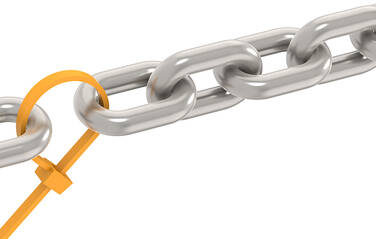When buying cable ties, you need to know that they are durable enough for the job in hand, and that they will be strong enough to carry any load you need to use them on.
How strong are cable ties?
There are as many applications for cable ties as there are types of cable tie, but whether you are using a nylon 6/6 ties to organise the cables under your desk, or a stainless-steel cable tie to secure poles or hoses in the oil and gas industry, you need a tie that is strong enough. How strong a cable tie is, is known as its tensile strength but what does tensile strength mean?
Tensile strength of cable ties
The tensile strength of a cable tie refers to the load capacity, or the maximum weight, a cable tie can bear safely, without breaking. You may find that a cable tie can tolerate more weight, but the tensile strength indicates baseline safety conditions for your project. For details of the individual tensile strengths of different types of cable tie, our article How strong are cable ties? has lots of information.
How is tensile strength measured?
In the UK, tensile strength is measured in kilograms and this will vary depending on the type and size of cable tie. For example, a standard nylon cable tie measuring 80mm x 2.5mm has a tensile strength of 8kg whereas a stainless-steel cable tie with a width of 7.9mm has a minimum tensile strength of 160kg.
What is loop tensile strength?
The loop tensile strength of a cable tie measures its ability to remain securely fastened around the load it is carrying. Measured in kilograms, it refers to the amount of force required to cause an assembled cable tie to fail.
What if the load exceeds the tensile strength?
What can you do if you have something to be fastened that weighs more than the tensile strength of the cable tie you have? As tensile strength refers to the tolerance limit of one cable tie, it is possible to use multiple cable ties with a combined tensile strength sufficient to bear the weight you want to manage. For example, a single, heavy duty cable tie with a tensile strength of 160kg is insufficient to take the weight of a pipe weighing 640kg, but four of the same cable ties have a combined tensile strength equal to the weight of the pipe (4 x 160kg = 640kg).
Why is tensile strength important?
When gathering wires together from home entertainment devices to a create a neat appearance, your cable ties will not have to work too hard to cope with the job. However, when securing large manufacturing components such as generator parts for transit, it is vital to have cable ties strong enough to secure the goods safely, with minimum vibration.
Cableties-online offers a wide and extensive range of nylon cable ties, stainless steel cable ties and installation tools to the domestic and commercial sectors, so whatever your speciality cable tie needs, or tensile strength requirements are, we will have the cable tie for you. Call us on 01623 412160 or email your enquiry to us at sales@cableties-online.co.uk and we will be happy to answer any questions you have.







